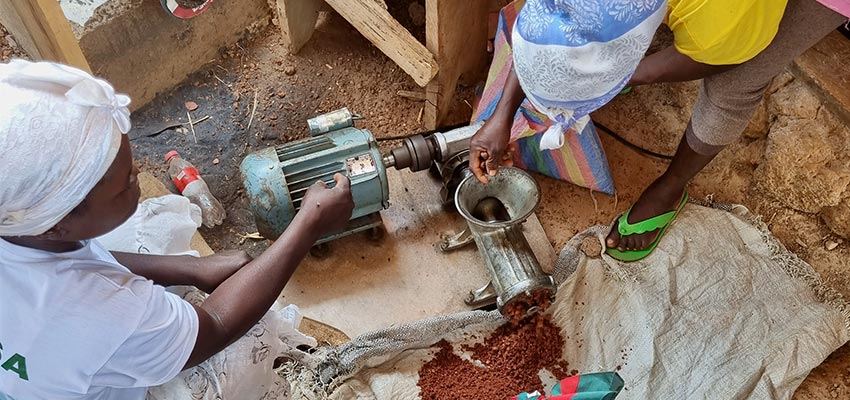
Through the D-Lab: Development class, we were selected to work on a development project for the benefit of Ayirkasa, a women’s collective based in Nandom, Ghana that focuses on empowering women financially. This is the first year of Ayirkasa’s partnership with D-Lab, which meant that we had the opportunity to spearhead the relationship and set expectations for what future development projects could look like. Our original task was to provide the group with a grinding mill for Shea nuts. Although only one of us had a background in mechanical engineering, we were determined to design a nut mill and put our best efforts into creating a prototype to deliver to the women of Ayirkasa given the short time window we had. Through a small needs assessment and user interviews, we were able to gauge what Ayirkasa members value, as well as to identify the specific challenges they face in their Shea butter production process. This understanding allowed us to tailor our design approach to create a solution that aligns with their priorities and long-term goals.
Meeting Ayirkasa
Ayirkasa is a collective of about 50 dedicated women in Ghana who empower each other by fostering financial security and environmental sustainability through a Shea butter business. Their teamwork and dedication shine during their bi-weekly gatherings, where they collaborate, organize finances, share knowledge, and support one another in their mission to build autonomy and create a resilient, thriving community. In addition, these meetings serve as a special space where they deepen their connection to one another and check up on each other. The women of Ayirkasa remain committed to supporting their families and creating better opportunities for their children, all while experiencing poverty and neglect.
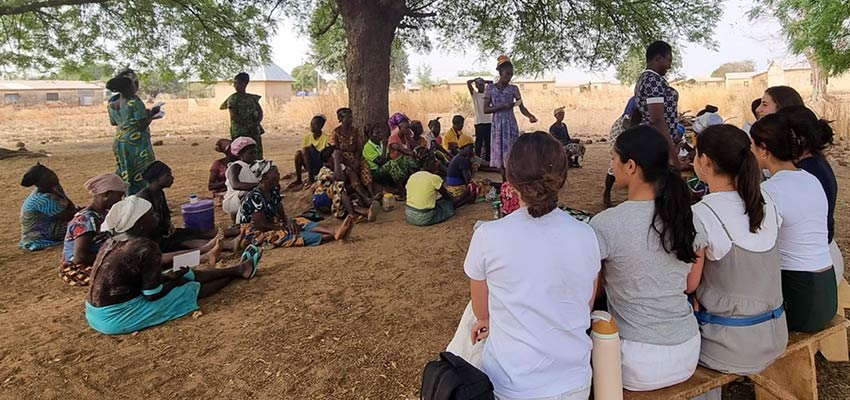
Our team had the privilege of meeting this resilient community of women and conducting interviews to gain insight into their challenges and needs. One significant challenge the women face is the manual labor involved in shea nut processing, particularly the crushing stage, which is usually done with a mortar and pestle. This process is time-consuming, physically taxing, and often causes shoulder pain. While some women can access mills to crush the nuts, they encounter further obstacles, such as the expense, far distances, long queues, or the mill owner's unavailability. These barriers make an already difficult process even more challenging. Additionally, their profit margins remain slim after committing so much time and effort into the process, with each bowl of shea butter earning only 50–80 Ghanaian cedis (about $3-5 USD).
Project In action
The needs assessment highlighted that crushing whole shea nuts is the most time-consuming and physically taxing step in shea butter production, often causing pain and fatigue after hours of manual labor. To address this, the project focused on designing a motorized crushing mill to reduce physical strain and drastically cut down the time required for this task. Input from Ayirkasa members was vital, ensuring the design met their specific needs, while collaboration with a local welder and mill expert confirmed that a motorized mill with a chopping blade was the most effective solution for crushing shea nuts, as other designs, like grooved plates, were less effective. A key challenge during prototyping was achieving the right mill size. Existing peanut mills on the market, which are smaller and designed for softer and smaller nuts, were unsuitable because shea nuts tend to clog them. Additionally, industrial-sized mills, like the public ones women pay to use, were too large and expensive to be a practical outcome of a first prototype. Another challenge was the oily nature of Shea nuts, which can cause residue buildup and lead to clogging if the mill isn’t cleaned regularly. To address this, the design included features that allowed the machine to be easily opened for cleaning, ensuring it remained functional over time. The resulting mid-sized mill effectively handled the larger shea nuts without clogging while remaining affordable and manageable. This design significantly improved efficiency, reducing the time to crush 10 standard bowls of nuts from four hours to less than 30 minutes. Although solar power remains a future goal, the motorized mill provided an immediate and impactful solution, offering a major improvement over both hand-crushing methods and the impractical alternatives currently available on the market.
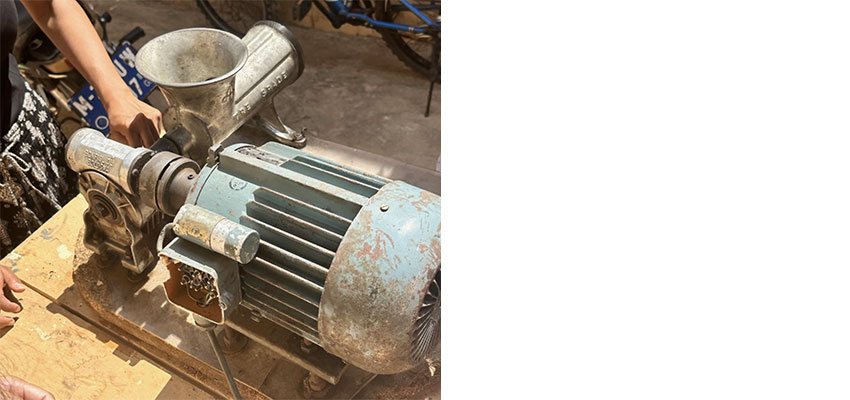
Impact of the nut mill
Providing the women with the Shea nut crusher will significantly reduce the amount of time that Shea butter producing process takes. After meeting the women and watching them crush the nuts by hand via mortar and pestle, we noted that having a motorized crusher would reduce a one-hour crushing time to between five and seven minutes. With more time available, the women can process larger quantities of Shea nuts, significantly boosting their production capacity as well as increasing the time available to do other chores or farming work.
Furthermore, the labor-intensive process of manually crushing nuts is physically demanding. A motorized crusher alleviates this strain, improving the overall well-being of the women. The women of Ayirkasa expressed enthusiasm and gratitude for the nut mill, recognizing its potential to ease their workload and provide them with a very necessary extra source of income. The mill represents not just a tool, but an opportunity for growth and empowerment.
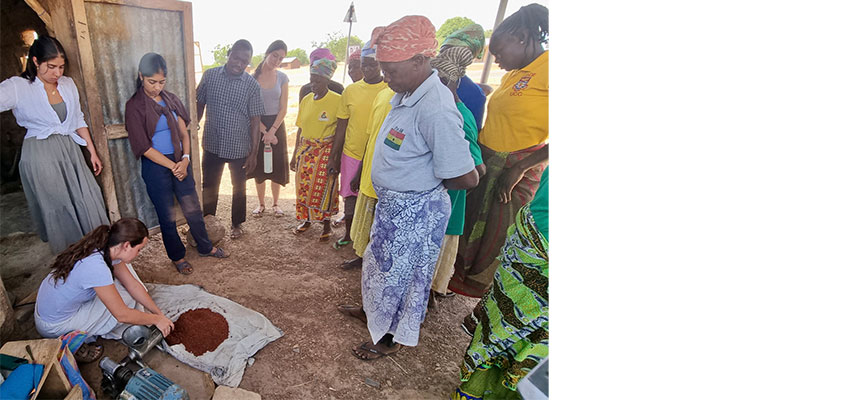
Reflections and lessons
When observing the Shea butter production process firsthand, we were shocked by how long and physically demanding the work was. The women of Ayirkasa spend hours each day producing the butter by hand, an exhausting series of tasks that in the end only leads to a profit of about 20 cedis (a little over 1 USD).
However, this work is essential for their livelihoods, providing a crucial source of income for themselves and a means of economic independence through Ayirkasa. Through our project, we aimed to start a meaningful relationship with these women and provide a solution that, while small in scope, could have a real impact on their daily lives. Almost all the women we interviewed emphasized that crushing was the most time consuming and physically exhausting step, so leaving them with a mill at the center will offer a significant improvement, saving them both time and energy.
Additionally, we interacted with other significant community members in Nandom who brought light to the other pressing challenges beyond Shea butter production. One major issue they highlighted was the high rate of malnutrition among pregnant women and children, a problem they have been trying to address by providing soy milk as a nutritional supplement. However, due to financial constraints, many women end up selling the soy milk instead of consuming it, prioritizing short-term income over long-term health benefits. These open conversations with leaders provided greater insight into the broader challenges within the community and the possibility for further improvement and collaboration with future D-lab teams.
Gratitude and moving forward
We are deeply grateful to the women of Ayirkasa for welcoming us into their community, sharing their knowledge, and trusting us to collaborate with them on this project. Their resilience, resourcefulness, and commitment to sustainability have been truly inspiring. This experience has not only reinforced our understanding of development work but also deepened our appreciation for the power of community-driven solutions.
We also extend our thanks to MIT D-Lab for providing us with the resources, mentorship, and support that made this project possible. Our mentors, including trip leader Caroline Morris, have guided us through every challenge, encouraging us to approach this work with humility and a learning mindset. Additionally, we are incredibly appreciative of our funders, whose generosity has enabled us to design and implement solutions that have a tangible impact on Ayirkasa and beyond.
Moving forward, we hope that this partnership between D-Lab and Ayirkasa continues to grow, bringing new opportunities for innovation and collaboration. While our project focused on addressing a specific challenge within the Shea butter production process, we recognize that there are many more areas where technology and thoughtful design can make a difference. We are excited to see future teams build upon this foundation, exploring sustainable energy solutions, expanding access to financial resources, and supporting broader community initiatives.
For us, this experience has been transformative. It has reinforced the importance of listening first, co-designing with the community, and approaching development work with adaptability and respect. As we return to MIT, we carry with us the lessons learned from Ayirkasa and a renewed commitment to using our skills in service of impactful, sustainable change.
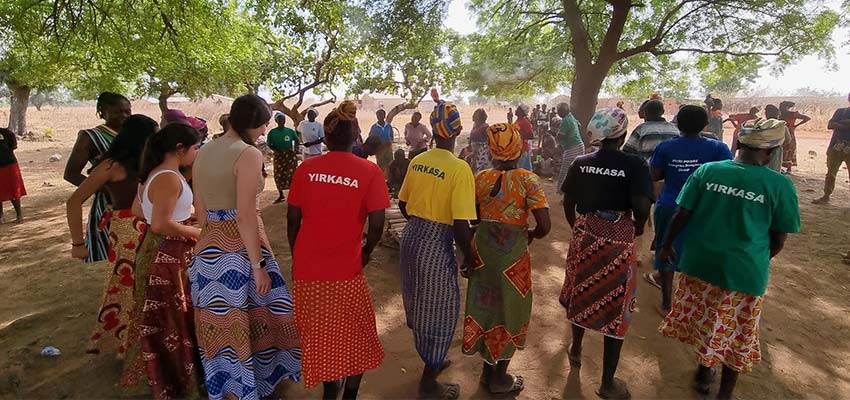
About the MIT D-Lab students
- Abhaya Ravikumar '25 - Fourth-year MIT undergraduate student from New York studying Computer Science and Engineering with a minor in Mathematics.
- Divya Rajaraman '27 - Second-year MIT undergraduate student from Massachusetts studying Mechanical Engineering (course 2) and Computer Science (course 6).
- Julianne Flusche '25 - Fourth-year MIT undergraduate student from New Jersey studying Mathematics (course 18) with minors in Finance (course 15-3) and Economics (course 14).
- Adriana Rivera-Socarrás '25 - Undergraduate senior at MIT majoring in Finance (course 15-3) and minoring in Computer Science (course 6) originally from Puerto Rico.
- Kristen Lee '25 - Fourth-year MIT undergraduate student from New Jersey studying Business Analytics (course 15-2) with a concentration in Economics.
- Maya Makarovsky '25 - Fourth-year MIT undergraduate from Newton, MA studying Computer Science, Economics & Data Science as well as Business Analytics.
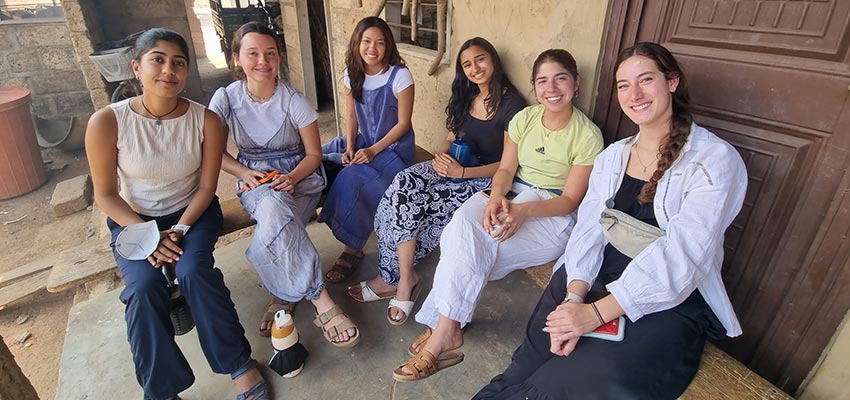
More information
MIT D-Lab class, D-Lab: Development
Contact
Libby Hsu, MIT D-Lab Associate Director of Academics
Caroline Morris, 2025 MIT D-Lab IAP Ghana Trip Leader

